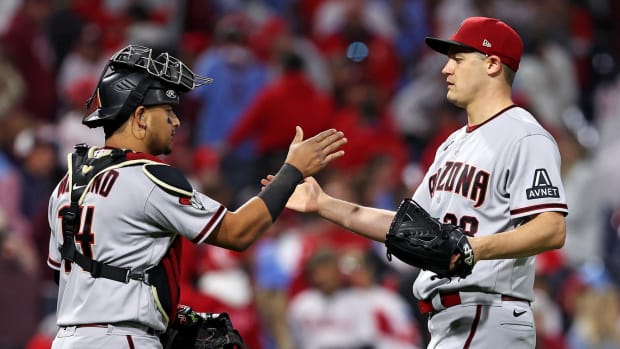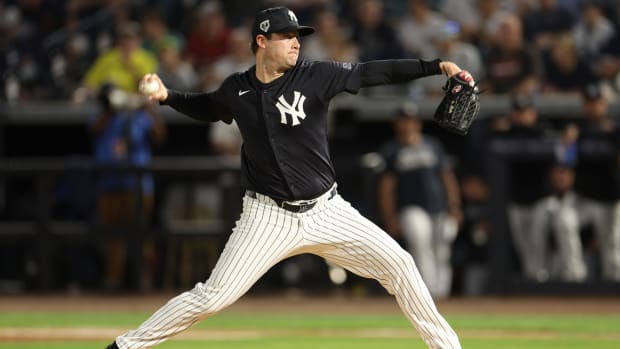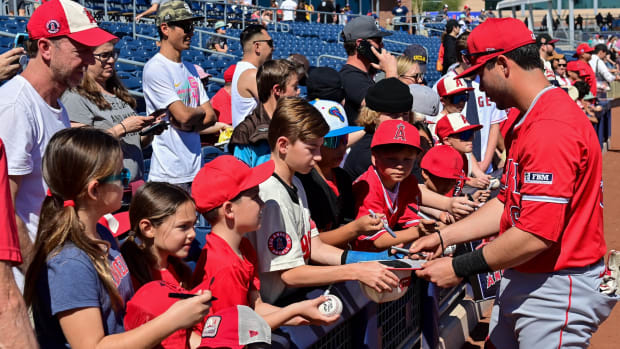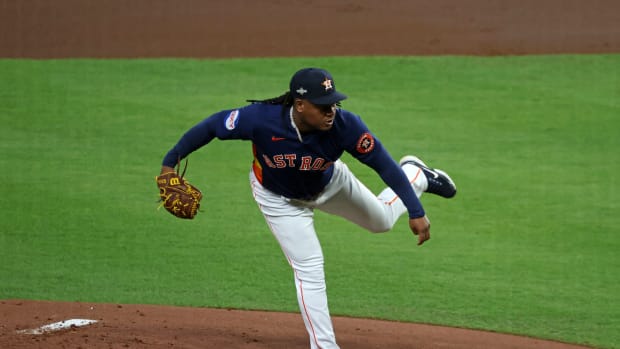On a night for Royals' bats, starter Chris Young secretly shines in Game 4
TORONTO — It was a perfect October afternoon. That much, Chris Young remembers.
He was 27 then, a Padres starter facing a mighty Cardinals lineup, and in the NLDS playoff game at a sun-rinsed Busch Stadium, he struck out 9 over 6 2/3 overpowering, shutout innings. Yes, the future was bright then for the tall and slender right-hander—“At the time, I thought there would be a lot more playoff opportunities going forward,” he says—but in the nine years since that moment, the last time he’d stepped on a mound in the postseason, he shuttled among four different organizations, underwent three surgeries, suffered from a mysterious condition that crippled his shoulder, and nearly walked away from baseball for good.
“Not the way you’d script a career, by any means,” Young said on the eve of his Game 4 start in the ALCS.
• MORE MLB: Full postseason schedule, start times, TV listings
On Tuesday afternoon at the Rogers Centre, with the best offense in baseball strutting into the game on the heels of an 11-run outburst in Game 3, with the great downtown cauldron roaring with the white-towel waving fans packed to the gills, with new allegations of sign-stealing looming over the afternoon, into the belly of the beast walked Young, now a 36-year-old soft-tossing, fly-ball pitcher whose baseball odyssey has been stranger and longer than any other player’s in this postseason. On a day when the Royals offense provided the fireworks, it was Young holding Toronto’s juggernaut offense in check. He did not get the win, with two runs allowed over 4 2/3 innings, but Young delivered by far the most notable performance of a game that swung the series advantage to the Royals, who are one win away from their second straight World Series after their 14-2 humiliation of the Blue Jays. It was a day in which Young—something of a surprise choice of Ned Yost’s to start this game over Kris Medlen—came through with an unexpected pitching performance as the Royals offense continued to do what it has been doing all series: mash.
The funny thing about the knuckleball: the magic of the pitch comes and it goes, and it was clear early that R.A. Dickey, the first knuckleballer to start an ALCS game since Boston’s Tim Wakefield in 2008, didn’t have his best stuff. The runs come in a hurry when the knuckleball isn’t knuckling, and the Royals quickly feasted, with leadoff man Alcides Escobar bunting his way onto base on the second pitch of the game (“I saw the third baseman, he’s playing a little bit back,” said Escobar, who drove in four of K.C.’s runs) before Ben Zobrist rocked a high knuckler over the centerfield wall for the early 2-0 lead.
Here, in a nutshell, is how the Royals hitters fared against Dickey: single, home run, walk, single, out, sac fly, out, out, home run, hit by pitch, out, walk. Royals hitters saw 48 pitches from Dickey, and swung and missed just five times. “Looked like there was a lot of movement on it, at least from where I was standing,” Toronto manager John Gibbons said. “But he had trouble commanding a little bit.” That’s a bit of an understatement, and Dickey’s lack of control combined with the Royals’ approach at the plate was a disastrous combination. Kansas City was an aggressive swinging team during the regular season, and it has become even more so in the postseason, yet still struck out just five times in Game 4 after doing so only twice in Game 3.
#http://www.120sports.com/video/v155058514/royals-dominate-game-4
Perhaps the Man in White got his instructions mixed up in his windowless, dimly-lit bunker out in centerfield, and was delivering signs to opposing team’s hitters. Whatever the case, the Royals, who are just the third team in LCS history to score 33 or more runs over the first four games, are not showing any signs of slowing down; it’s an offense firing on all cylinders at just the right time. Kansas City has now out homered the Blue Jays—who led the majors in homers during the regular season, and out-homered the Royals 232 to 139 during the season—12 to 11 this postseason. Deep, balanced, relentless: this is the Royals offense in 2015. “When you look at our lineup, there are no dead spots in it,” said Yost after watching every starter in his lineup but Mike Moustakas get a hit, as his Royals collected 15 hits for a second straight game. “The offensive sequence continues to flow from 1 to 9, and that’s big. You don’t get to a point where you’re saying, ‘Oh, man, we’re at the bottom of the order where the rally will stop—these guys all have the ability to keep a rally going, which is big.”
Of course, it all starts with your starter, and because no lead is safe against this fire-breathing lineup, because when you’re staked to a four-run lead in the first and a 5-0 lead after two innings against this team you feel like you’re merely even, it seemed inevitable that this Toronto offense would come roaring back. But other than the two runs Young allowed in the third, on a Josh Donaldson double and a Jose Bautista ground out, the most frightening offense in baseball was held in check by K.C.’s unassuming right-hander. “Chris Young threw the ball great,” Yost said. “We got there in the fifth inning, and my mindset was with Donaldson, Bautista, those guys, I really didn’t want them seeing Chris for the third time. But to get us into the fifth inning right there with the lead, he just pitched a great game.”
Watch: Mets’ Daniel Murphy homers in fifth straight postseason game
Two years ago, Young was done. In the summer of 2013, he was languishing at Triple-A Syracuse, with a shoulder that would give out after only 30 pitches, a shoulder in such miserable shape that for years, through his seasons as a Met, the pain was so unbearable he couldn’t sleep on his right side. He went under the knife again—he’d had his second shoulder surgery just a year earlier—this time to fix his neck, to address the thoracic outlet syndrome that was causing his shoulder pain. In 2014, he returned to the majors for the first time since 2012 and went 12-9 with a 3.65 ERA in 29 starts with the Mariners, but even after being named AL Comeback Player of the Year, no team seemed to want him over the off-season—except for the Royals, with GM Dayton Moore signed him in March, a few weeks into spring training. Young’s base salary: $675,000.
Young averaged 86.4 on his heater, one of the slowest fastballs in the game, and yet even without the big fastball, he can seem intimidating. He is 6'10," (he averaged 13.4 points over two years as Princeton’s center) but he seems to stand as tall as the CN Tower on the mound. It’s unsettling for the hitter to see a baseball coming from seven feet off the ground, and from the angle it creates. Young’s fastball now tops out in the high 80s, and yet the Blue Jays early on looked overpowered, as Young struck out the side in the first. Going back to his remarkable Game 1 relief outing in the NLDS, of the first 19 batters Young faced this postseason, he struck out 10.
“He was aggressive—that was the key for him,” Royals catcher Salvador Perez said. “He went out there, with no fear. For the last few weeks, that’s his mentality: no fear.”
If the Royals win just once over their next three games, the World Series will be the next stop in Chris Young’s long and strange journey. It has been an exhilarating baseball journey in Kansas City, but it has not been an easy year for the pitcher, who lost his father, Charles, in late September, after a long battle with cancer. One day after his father passed away, Young tossed five no-hit innings for the Royals at Kauffman Stadium, the start of a remarkable run—he’s allowed just four runs over 20 innings going back to that Sept. 27 start—that has continued deep into this October.
On Tuesday, moments after his return to the postseason, nine years in the making, was complete, Young smiled as he stood in front of his locker, and said, of the man who taught him to love the game, “He’s with me. And he’s enjoying this as much as I am.”


































